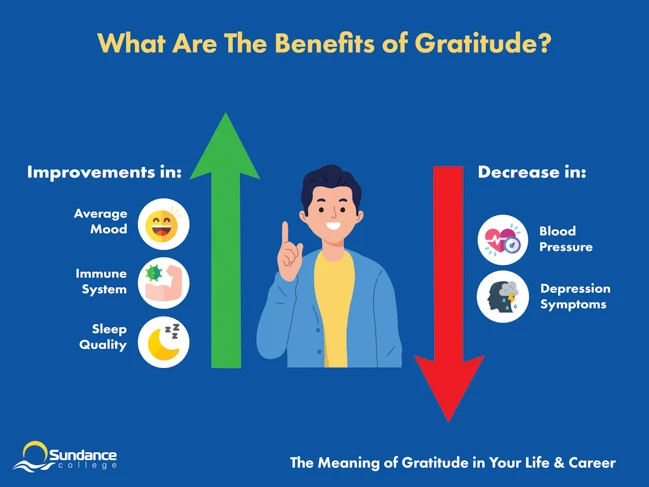Blog / The Meaning of Gratitude in Your Life & Career
The Meaning of Gratitude in Your Life & Career

Explore our Diploma Programs
- Business, Hospitality, and Legal
- Health and Human Services
- Technology
Table of Contents
How was your Thanksgiving long weekend? Thanksgiving has always been a time to express gratitude for all the good in our lives. It is a time to celebrate abundance and give thanks for the blessings or support we have received – regardless of where it’s from.
As we return to the week refreshed and ready to work on our studies or careers or, more generally, our purposes in life, it is a good time to consider the potential benefits of gratitude, which is the focus of Thanksgiving – and how we can make Thanksgiving perpetual in our lives, in the words of poet and philosopher, David Henry Thoreau. And if you are one of our students about to embark on your new career with your Sundance College education, this article is timely. Expressing gratitude to your employer is always a winning approach. Our Advice for a New Hire offers suggestions on how and when to express that gratitude.
In this article, we further explore the concept of gratitude, how to cultivate it, how gratitude makes you a great student or employee, and how it can translate to career success.
What is Gratitude?
Gratitude is often thought of as a feeling of thankfulness and appreciation for what you already have. Think of a cup half full. Is it really half full or is it half empty? If you say half full, you’re on the right track.
Gratitude can stem from the recognition that something good happened to you or something beyond your own self is responsible for that good thing happening to you.
But gratitude is more than just a feeling or reactive state. It’s also an active practice that can help you focus on the positives in your life, count your blessings, and be more present in the moment. When practiced regularly, gratitude exercises with specific techniques can increase your overall happiness and well-being.
What does Gratitude mean?
We talked about gratitude as a thankfulness or celebration for what has been has happened or been received. It can also be a conscious appreciation of life, relationships, and accomplishments. Gratitude is not just a reaction to good things happening. It can also be an action you take. Practicing gratitude as an action can increase happiness and well-being. But why take time out of your day to do it actively instead of just as a reaction?
What are the Benefits of Gratitude?

We’re happy to share the best news first; psychologists have proven that a gratitude journal is an anti-depressant!
One of the benefits of active, habitual gratitude is that it can help reduce symptoms of depression. A number of studies have shown that grateful people are less likely to be depressed and that gratitude exercises can help people who are already depressed become more positive and upbeat.
Specifically, gratitude practices and procedures like journalling managed to multiply positive feelings and grant happiness and life satisfaction from people’s own point of view when practicing – while reducing negativity and depression symptoms.
Gratitude really is medicinal. A concrete gratitude practice of some kind can lower your blood pressure, grant better sleep, and even boost your immune system.
Gratitude helps because it shifts our focus away from negative experiences and towards the good things in our lives. It also helps us connect with other people and builds social support networks, which are important for combatting depression.
Finally, it encourages us to take action and do things that make us happy, which is a key part of recovering from depression. So, now that gratitude as a practice makes sense, how do you get into it and make it a central habit?
Gratitude Journaling to Discover the Benefit of Gratitude
Our favourite gratitude practice, as you might have guessed, involves journalling what you’re grateful for.
As already mentioned, gratitude journalling is one easy way to start incorporating more gratitude into your life. Every night or every morning before the day begins, open a journal and take a few minutes to write down five things you’re grateful for that day.
A single “grateful” could be something as simple as the sun shining or your dogs’ tails wagging when you get home from work. Or a “grateful” could be something as grand as a milestone you reached in your studies or your career.
How to Do Gratitude Journalling
A gratitude journal can be whatever you make of it! What matters is the habit and practicing gratitude wholeheartedly. Try a simple short statement to keep the task lower word count, taking less time. As long as you’re really feeling it, you can get the benefit. But if you get into a groove on writing about something you’re passionate about, there’s no need to stop at 1 or 2 sentences.
Gratitude has many benefits, but the more formal you get with practicing gratitude, the better the results can be.
Being Grateful for Opportunities
Students at Sundance College know that all our curriculum is geared towards job-readiness, and sometimes that means encouraging traits in addition to sharing knowledge. Gratitude is one of these traits we encourage. Our practicum providers and employers are looking for students and graduates with the right knowledge and skill set, including a positive attitude and sense of gratitude.
When you’re grateful, you might find you’re more likely to take advantage of the opportunities that come your way. You’re also more likely to be happy and optimistic, which can have a positive ripple effect on you as well as on those around you.
So next time something bad happens, try to find something good about it and be grateful for it. It won’t always be easy, but it will always be worth it. Graduates looking to make the best of job opportunities should never forget the importance of gratitude.
Gratitude & Happiness
As noted, research has shown that gratitude is a key factor in generating happiness. It turns out that regularly practicing gratitude can increase your overall satisfaction with life, make you more resilient in the face of stress, and increase your overall sense of well-being. And, as mentioned, gratitude also seems to have some impressive physical benefits!
Be Happy & Be Grateful
Adopt as your mantra: ‘I am happy because I am grateful. I choose to be grateful. That gratitude allows me to be happy’ (Will Arnett). No one is ALWAYS happy, but we can try. Being happy brings you peace and contentment while being grateful helps you focus on the positive aspects of your life.
Being Grateful for Education
In these uncertain economic times, it’s important to be grateful for what we have – and one of the many blessings we should count is our education. Whether we’re just starting out on our educational journey or well into it, education is an investment in the asset most likely to give us a good ROI (return on investment): ourselves.
Education:
- Gives us the opportunity to learn new things and grow intellectually to provide value to others.
- Teaches us how to think critically and question everything – something that’s essential to growing economies and free societies.
- Prepares us for future opportunities, both professionally and personally.
- It justifies a higher salary and perks in job offer negotiations
- It opens doors to other career paths to improve standard of living
- It demonstrates that we have the necessary qualifications to be successful
Gratitude for education is not something our instructors spend valuable class time teaching, but it is something that the best students learn as they go.
We hope you’ve left the Thanksgiving holiday weekend feeling grateful, happy, and contented.
Our staff and students know the value of positivity, and by highlighting gratitude, we can magnify it. If you’re one of our students reading this, let’s exemplify how gratitude can also turn into success. If you’re thinking of enrolling, please take this as your first, free lesson! Connect with us to learn what value you can bring to your community and your industry of choice.
Subscribe for more career advice
Blog Categories
Share on:
